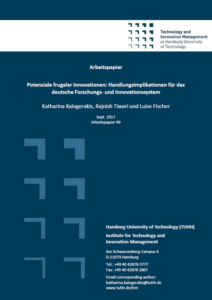A new working paper by our CFI colleagues Malte Krohn and Cornelius Herstatt looks at “The question of a frugal mindset in western MNCs – exploring an emerging phenomenon with a systematic literature review” (Working Paper no. 103, TIM/TUHH)
Frugal innovation in the context of developed ecomomies has witnessed increasing interest in recent years. For Western multinational companies (MNCs) emerging markets represent promising opportunities for growth as well as the threat of new local competitors. Furthermore, economic developments drive the demand for frugal products within Western countries. Succesfully mastering this challenge means that Western MNCs have to challenge prevailing paradigms within their organizations. Literature suggests that these companies have to develop a frugal mindset to succeed in frugal innovation. However, to the best of our knowledge no publication addresses the phenomenon on an empirical basis or provides enough detail for further empirical investigation. To address this gap, we conducted a systematic literature review of 80 publications in the frugal innovation field.
Building on the theroetical background of the global mindset concept, we assume that a mindset is a cognitive orientation that promotes task completion, which in turn improves task performance. Our qualitative analysis suggests that in the context of frugal innovation improved task performance would positively contribute to the following goals: (1) strategic alignment of innovating for cost conscious consumers, especially in emerging markets (2) deepening the understanding of cognitively remote customers’ needs and the context in which they live or work and (3) satisfaction of these customers’ needs with frugal solutions. Furthermore, we propose that a frugal mindset can be cultivated along the phases of (1) accepting the new realities of changing markets and competition, (2) a willingness to reconsider current approaches and (3) a willingness to take the necessary action and implement new approaches regarding the identified goals. By developing a definition based on this two-dimensional construct, we build on the theoretical foundations of a well-established mindset concept from the field of organizational behavior/strategic management and integrate various descriptions of the frugal mindset. This contribution provides a solid theoretical basis for further research.

